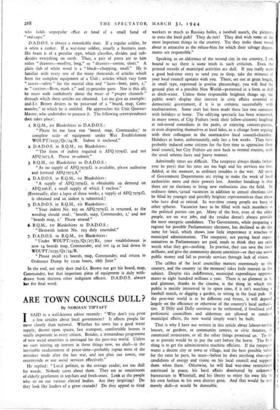ARE TOWN COUNCILS DULL?
By NORMAN TIPTAFT
ISAID to a well-known editor recently: "Why don't you print a few articles about local government? It affects people far more closely than national. Whether his town has a good water supply, decent open spaces, fast transport, comfortable houses is vitally important to every citizen. Besides, a tremendous programme of new social amenities is envisaged for the post-war world. Unless we start stirring up interest in these things now, we shall—in the inevitable readjustment of peace-time—probably repeat most of the mistakes made after the last war, and not plan our towns, our countryside or our social services effectively."
He replied: "Local politics, to the average reader, are too dull for words. Nobody cares about them. They are so reminiscent of elderly gentlemen in top-hats and frock-coats. Look at the people who sit on our various elected bodies. Are they inspiring? Do they look like leaders of a great crusade? Do they appeal to tired workers as much as Russian ballet, a football match, the picture. or even the local pub? They do not! They deal with some of the most important things in the country. Yet they make them sound about at attractive as the refuse-bins for which their salvage depart- ments are responsible."
Speaking as an alderman of the second city in the country, I am bound to say there is some truth in such criticism. Even the printed records of municipal activities are dull. If you really want a good bed-time story to send you to sleep, take the minutes ot your local council upstairs with you. There, set out at great length, in small type, expressed in precise phraseology, you will find the ground plan of a possible New World—presented in a form as dun as ditch-water. Unless those responsible brighten things up, the public won't display that interest in civic affairs essential to democratic government, if it is to compete successfully with totalitarianism. Some start has been made these last two summers with holidays at home. The edifying spectacle has been witnessed, in many towns, of Cit,y Fathers (with their fellow-citizens) laughing at red-nosed comedians in the parks, or enjoying concert-parties, or even disporting themselves at local lidos, as a change from arguing with their colleagues in the unattractive local council-chamber. Holidays at home, unfortunately, only last a few weeks. They have probably induced some citizens for the first time to appreciate their local council, but City Fathers are now back to normal routine, with the usual solemn faces and heavy manner.
Admittedly times are difficult. The ratepayer always thinks (what- ever he pays) that his rates are too high and his services too few. Added, at the moment, to ordinary, troubles is the war. All sorts of Government Departments are trying to make the work of local authorities more and their powers less. Another handicap is that there are no elections to bring new enthusiasts into the field. In ordinary times, -casual vacancies in addition to annual elections can be filled by younger and possibly brighter representatives than those who have died or retired. In war-time young people are busy in other spheres. Vacancies have to be filled with such members as the political parties can get. Many of the best, even of the older people, are on war jobs, and the residue doesn't always provide the most energetic candidates. The Government, while preparing a register for possible Parliamentary elections, has declined to do the same for local, which shows how little importance it attaches to municipal administration. The ratepayer, not paying local repre- sentatives as Parliamentary are paid, tends to think they are only worth what they get—nothing. In practice, they can save the rates millions, and give the community decent amenities—or they can waste public money and fail to provide services through lack of vision.
The calibre of the local councillor matters enormously to the country, and the country (at the moment) takes little interest in the subject. Despite this indifference, municipal expenditure approxi- mates to eight hundred millions a year. There is no gramour in it, and glamour, thanks to the cinema, is the thing in which the public is mainly interested in its spare time, if it isn't watching a football match, or digging a garden, or sitting in the local pub. If the post-war world is to be different and better, it will depend largely on the efficiency or otherwise of the country's local authori- ties. If Dilly and Daily continue to be enthroned, if fossilised and prehistoric councillors and aldermen are allowed to conduct municipal affairs, the new world simply won't be built.
That is why I have not written in this article about labour-saving houses, or gardens, or community centres, or civic theatres, or communal restaurants, or all the other things promised us. To do so at present would be to put the cart before the horse. The first thing is to get the administrative machine efficient. If the ratepayer wants a decent city or town or village, and the best possible value for the rates he pays, he must—before he does anything else—put candidates of energy and vision on his local council and support them when there. Otherwise, he will find war-time restrictions continued in peace, his local affairs dominated by unknown bureaucrats in Whitehall, and his liberty to enjoy his own life in his own fashion in his own district gone. And that would be not merely dull—it would be damnable.






















 Previous page
Previous page